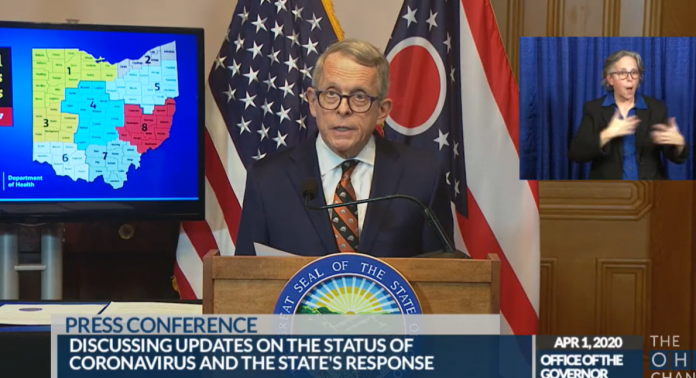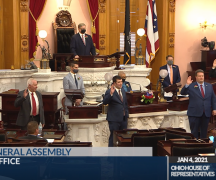On Tuesday, Ohio Gov. Mike DeWine downgraded many of the orders he’d issued in response to the coronavirus to advisories. Then he conceded that even when they were still orders, compliance was largely voluntary.
With almost all groups of businesses expected to reopen by the end of the month, the governor announced that he was replacing the “Stay Safe Ohio” order issued on May 1 with “Urgent Health Advisory: Ohioans Protecting Ohioans.”
“We are now moving from orders to recommendations,” DeWine said, referring to former rules such as one that required people entering Ohio from out of state to self-quarantine for 14 days after doing so.
Still in place are rules requiring businesses to enforce social distancing in their establishments. The rules also require employees who interact with the public to wear masks.
DeWine originally required patrons of such businesses to wear masks — in part to protect the people who have to work there. But he backed down amid a backlash just a day later.
As part of his new advisory, DeWine urged the elderly and those with compromised health to continue to stay home as much as possible and when they go out, to keep themselves safe as possible. He also urged everyone else to do all they can to check the spread of the disease to keep from infecting more-vulnerable neighbors.
After a reopening weekend that saw some decidedly non-distanced bars and restaurants in Columbus and Cincinnati, DeWine was asked on Tuesday whether Ohioans can be trusted to voluntarily act responsibly.
“Ohioans have demonstrated in the last two months that they will use their common sense; that they will do what needs to be done,” DeWine said. “I think my life experience with Ohioans… I think we’re a practical people, we just roll up our sleeves and do what we need to do every day and that simply is what we’re asking Ohians to do as we continue this.”
DeWine and local officials say they’ll serve citations against businesses and people who flout the orders that remain, but the governor conceded that the state’s power only goes so far.
Asked what the practical difference was between the former public health orders and the new public health advisory, DeWine said, “Virtually nothing.”
He added, “As far as what people do… it’s really not much of a difference because the travel was pretty much of a request anyway.”
It was a jarring contrast to DeWine’s Twitter feed, where some of his detractors were simultaneously posting a photo of the “Tiny Tyrant” DeWine superimposed against a background of Nazi brownshirts, or a headshot of DeWine, with a photoshopped toothbrush mustache and Nazi uniform.lizteaQ@LizteaQ ·
The implication, apparently, was that the measures the Ohio governor had taken against coronavirus were tantamount to launching a world war or attempting genocide.
As Ohio’s leadership puts most of the responsibility on Ohioans to fight the spread of COVID-19, the numbers of cases and deaths continue to drag along a plateau.
There were 498 new cases reported Tuesday, not far from the average of 580 reported per day over the past three weeks. Also on Tuesday, 63 more Ohioans were reported to be dead of the virus, also close to the 44-person daily average reported over the same period.
Meanwhile, there appeared to be some confusion among state leaders over whether Ohio has adequate testing capacity.
Lt. Gov. Jon Husted on Tuesday said, “Adequate testing is not something we have had until recently, so that was not something we could deploy earlier on.”
However, Ohio Department of Health Director Amy Acton earlier this month said that even when Ohio hopes to be conducting 22,000 tests a day, it won’t be enough. For that reason, testing will be limited to people who have coronavirus symptoms or who work in group settings where others have tested positive.
DeWine Press Secretary Dan Tierney said Ohio’s testing capacity was up to about 18,000 people a day as of Tuesday. But the Capital Journal on Monday reported that the number daily tests actually conducted is significantly less than the state’s capacity.
***
More from Ohio Capital Journal.
House Republicans vote down mask mandate for lawmakers and staff
Ohio House Republicans squashed a proposal from Democrats on Tuesday that would have required lawmakers and staff to wear face masks while conducting House business to slow the spread of COVID-19.
The House Rules and Reference Committee, an arm of House leadership, recommended postponing the issue indefinitely, paving the way to the proposal’s demise. The postponement came on a motion from House Majority Leader Bill Seitz.
“This small Democratic minority in the Ohio House is not going to govern what the majority does,” he said after the vote. “They don’t have that kind of control over the duly elected representatives of the people.” READ MORE
State Representative Juanita Brent, D-Cleveland, announced legislation Friday that would repeal criminal prohibitions for possession and trafficking of cannabis, and vacate cannabis possession criminal sentences, expunging such offenses from the record.
“It is about time we stop criminalizing a plant (Cannabis),” Brent said. “Our police should be focusing their time and resources on more serious crimes. This is also an opportunity to strengthen our workforce with more tax-paying contributors, instead of keeping people from a job because of a background check.”
In a release Friday, Brent said a separate bill would authorize the use of medical cannabis for autism spectrum disorder.
Ohio House Dem wants to eliminate cannabis prohibitions
State Representative Juanita Brent, D-Cleveland, announced legislation Friday that would repeal criminal prohibitions for possession and trafficking of cannabis, and vacate cannabis possession criminal sentences, expunging such offenses from the record.
“It is about time we stop criminalizing a plant (Cannabis),” Brent said. “Our police should be focusing their time and resources on more serious crimes. This is also an opportunity to strengthen our workforce with more tax-paying contributors, instead of keeping people from a job because of a background check.”
In a release Friday, Brent said a separate bill would authorize the use of medical cannabis for autism spectrum disorder. READ MORE





